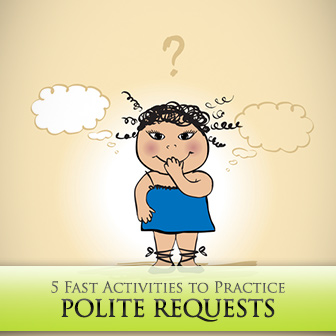I Hate to Bother You But: 5 Fast Activities to Practice Polite Requests


Polite phrases are important when learning a language. For anyone who has traveled, it is obvious that please and thank you are some of the most useful things to learn in any language. In the classroom, you will probably be the only one appreciative of polite language however if your students ever have the opportunity to speak English outside the classroom, this will be the most important thing you can teach them.
Context
When introducing questions for the first time, it is important to put them in context. After the introduction of vocabulary, phrases and meaning, drill the target language and then ask your students to think about when they would use the new structure. For instance, you would not randomly walk up to someone on the street and say “Where is the bookstore?” When demonstrated, your students will see that in a real life situation, it would be best to add some polite words and phrases around the edges of the request. Once they understand the need for this and you have paired polite phrases with your target structure, they should always be practiced together in the same way that you teach a cat instead of simply cat. Starting to use polite language in the introduction phase will ensure that your students associate the two from the very beginning.
Practicing model dialogues is always an excellent opportunity to use polite phrases. For example, when teaching students the structure “How much is this ~?” have them practice a model dialogue or role-play based on the one below:
A: Excuse me. How much is this book?
B: It’s $20.
A: Oh, thank you!
B: You’re welcome.
Half the dialogue is simple polite language which frames the target structure. This is much more beneficial for your students to study than the very simple two line target structure because it gives the question some context and enables students to see the purpose of such a question. If a math teacher explains that her classes will help students balance a checkbook, they may be more eager to pay attention or at the very least understand the purpose of learning such skills. In the same way, understanding the reason for studying English topics and structures can motivate your students. If your students practice dialogues like the one above throughout their studies, they should have extensive practice using polite phrases and will be more comfortable using English outside the classroom too.
Classroom English
Classroom English is another chance to have students practice polite phrases. If possible, make a set of flashcards for these words and phrases to post throughout the classroom. This will help students remember them and make prompting them much easier. Here are some examples of phrases for students to use in class:
- May I have another handout?
- Can you please repeat the question?
- Excuse me.
- Please.
- Thank you.
- You’re welcome.
You can create your own set and add to it as necessary throughout the year. When working with very young children, it may be enough to have them say “Paper please.” instead of just “Paper.” when they would like a piece of paper or a handout from you. It is a very simple thing but important to reinforce as much as possible. Whenever students ask you for something, you can wait for them to say please before giving it to them. It will not be long before students automatically say please when making a request.
Teacher's English
Your language in the classroom will affect your students as well. Say please when giving directions, thank you when students hand in worksheets and you’re welcome in response to students. The more you model polite language in your daily interactions with students, the more familiar they will be with when certain phrases are used and they will feel more comfortable using them when interacting with you and other students.
Polite phrases are not covered extensively in most textbooks however it is important that you give your students many opportunities to practice polite language and make them use it in the classroom. Polite classroom English can be a short section on every exam and polite phrases can be included in many practice activities. The more practice and exposure your students have to polite language, the better they will be at using it.